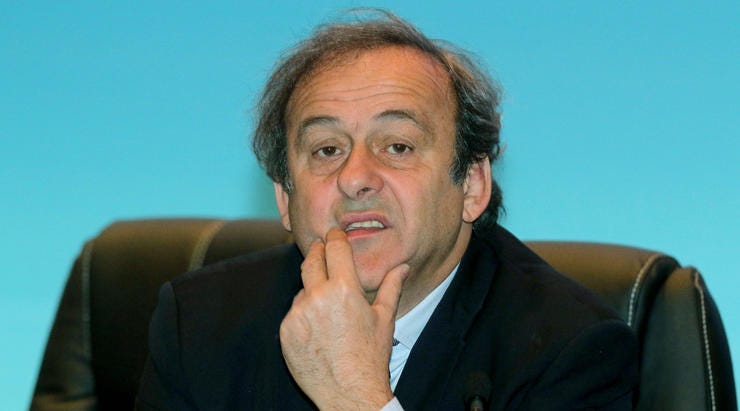Sepp Blatter’s demise should herald complete reboot of football governance
The FIFA president’s exit gives the sport a chance to change its image.
Last Friday Sepp Blatter was re-elected as FIFA president for a fifth term with the sort of mandate rarely enjoyed by democratic governments.
Polling 133 of the 209 votes, Blatter was backed by almost two-thirds of the global footballing family.
Except he wasn’t. He might have received the warm handshakes that matter electorally, from the anointed representatives of the national FAs, but the FBI investigation into FIFA’s finances had lost the global governing body whatever popular support it once had. With serious questions raised by governments and sponsors, Blatter had won the battle but lost the war.
He had lost the support of key voices in Europe. Not so much Greg Dyke, whose calls for a UEFA-led boycott were typically honest and passionate but looked doomed to be hollow sabre-rattling: it quickly emerged that Spain and France had voted for Blatter, and subsequently that Germany was in no mood to relinquish its hard-won world crown. But Michel Platini had finally broken cover.
With the eye for the wider game he so often displayed as a player, Platini had bided his time. As a modernising UEFA president since 2007, the Frenchman had been expected to run for the FIFA job, but prudently saw that Blatter’s influence was impossibly wide. Having been FIFA president since 1998 and before that its general secretary since 1981, the Swiss had made a lot of friends and earned a lot of favours.
Rivals
Prince Ali bin Hussein made this year’s election more of a contest than many had imagined, and the presence of an even slightly realistic alternative helped make the idea of change much more tangible than in Blatter’s uncontested re-elections of 2007 and 2011 — the latter after Mohamed bin Hammam dropped out amid accusations of bribery. Bin Hammam had helped Blatter defeat the 2002 nominee Issa Hayatou, despite FIFA’s then secretary general Michel Zen-Ruffinen asking Swiss prosecutors to investigate alleged wrongdoings. Blatter sailed through that squall and appeared to be clinging onto the tiller for another four-year term: “For the next four years I will be in command of this boat called FIFA,” he beamed after last week’s re-election, “and we will bring it back ashore, we will bring it back to the beach.” But this was one storm Sepp couldn’t ride out.
With barely a member of the Executive Committee untouched by allegations, the president was suddenly alone — and with the strong suspicion that he might be the investigators’ №1 target. Blatter may not have been voted out, but like many a long-term leader — from Robert Walpole to Tony Blair — he stepped down before he could be pushed. Even in resignation, Blatter dissembled.
Although happy to be seen as the smiling face of FIFA, he was quick to claim that he couldn’t know everything: “The Executive Committee includes representatives of confederations over whom we have no control, but for whose actions FIFA is held responsible,” he harrumphed.

What next?
Blatter’s departure will presumably not be the last. With so many accusations sullying so many reputations, this represents an unparalleled opportunity to steam-clean the image of football’s governing body.
Even the worst reputations are not irredeemable, as shown by the example of FIFA’s Swiss neighbours the International Olympic Committee. For decades an almost comical byword for corruption, the IOC had its night of the long knives over the awarding of the 2002 Winter Games to Salt Lake City.
Again it was the US Justice Department who investigated; again heads metaphorically rolled, with 10 IOC members expelled and another 10 sanctioned. Since then, the IOC is widely recognised to have cleaned up its act. FIFA needs to do so too, in deed as well as word.
Blatter and his mandarins may not be the last victims of the investigation. Many are now questioning the validity of the process by which the 2018 World Cup was awarded to Russia and 2022 to Qatar. It is far from fantastical to imagine that one or both of those decisions might be rescinded by the new-look FIFA.
The new guy
Much of that might depend on its new head. If Ali bin Hussein were to run again and be elected, the Jordanian prince might not have a strong desire to cancel the Gulf’s first World Cup. If Platini the politician gets the nod, he might be conciliatory toward the power-brokers outside Europe whom Blatter so assiduously shmoozed.
For a start, there’d be an election to win. It’s also worth noting that not everybody regards Platini as infallible. Quite aside from the feeling that the runaway importance of UEFA’s Champions League isn’t always the best thing for the game, there are legitimate concerns over the recent retooling of the European Championship into a bloated 24-team format from 2016 and, in 2020, a bizarre travelling circus held in 13 different countries.
Given a more open field, Platini may also lose his USP as the young moderniser. The various pro-celebrity candidates who came forward this spring might have another go. Their presence might split the vote, but such things happen in democratic elections. Let’s hope that’s what football gets.
Originally published by FourFourTwo on June 2, 2015.





